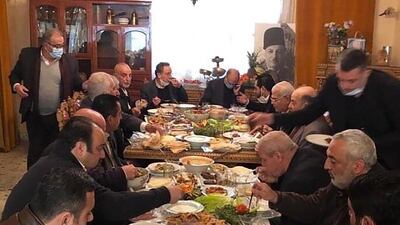Lebanon’s caretaker Minister for Public Health, Hamad Hassan, was admitted to hospital on Wednesday after contracting Covid-19, a local medical centre said.
Saint George hospital described Mr Hassan's health as “good”.
The hospital is one of two that is administered by his political party, Iran-backed Hezbollah, in a suburb south of Beirut.
Mr Hassan had announced earlier in the day that he was isolating himself and had taken a PCR test after three members of his office tested positive for the virus.
There has been a surge in the number of coronavirus cases in Lebanon caused by end-of-year festivities, leading to the start of a strict lockdown on Thursday, which will be in force until the end of the month.
The pandemic has killed 1,705 people in the crisis-stricken country, with 32 deaths and 4,557 new cases in the previous 24 hours, the Health Ministry said on Tuesday.
In total, 226,948 people have been infected by Covid-19.
Lebanese hospitals are ill-equipped to fight the pandemic because of the country’s protracted economic crisis.
Mr Hassan was criticised last week for attending a lunch with other officials in the eastern city of Baalbek.
Lebanon’s parliamentary health committee met on Wednesday to finalise laws that will allow the country to import vaccines.
Lebanon has ordered 2.1 million coronavirus vaccines from Pfizer-BioNTech and 1.5 million through Covax, the WHO's vaccination programme for lower-income countries, committee head Issam Araiji told The National.
But they cannot be imported until Lebanon has passed a law protecting vaccine makers from liability in case of side effects.
“We don’t have a law in Lebanon for emergency-use medication or vaccines like in Europe or the US,” Mr Araji said.
The law will hold the Lebanese government responsible for side-effects until the WHO gives full authorisation to vaccine makers, who now operate with an emergency authorisation.
This could take months or years, Mr Araji said.
After MPs finalise the draft law, Speaker Nabih Berri must assign a date for Parliament to vote on it. That could be this week, local media reported.
Lebanon has paid a deposit of $4 million to Pfizer BioNtech and another of $4.3m to Covax, Mr Araji said.
Pfizer and BioNTech “gave us a special offer of $18 a dose”, he said. Two doses are needed for each person.
The Pfizer-BioNTech vaccines are expected to arrive in Lebanon in early February, officials said.
The Covax vaccines should be delivered in the second half of the year, a WHO representative said.
The World Bank is considering a request by the Ministry of Health to finance the procurement of the Covid-19 vaccines through a loan, the amount of which has not yet been disclosed.
Lebanon has a dozen freezers originally bought by the WHO in 2017 to store vaccines.
The organisation is providing the country with six more freezers.


